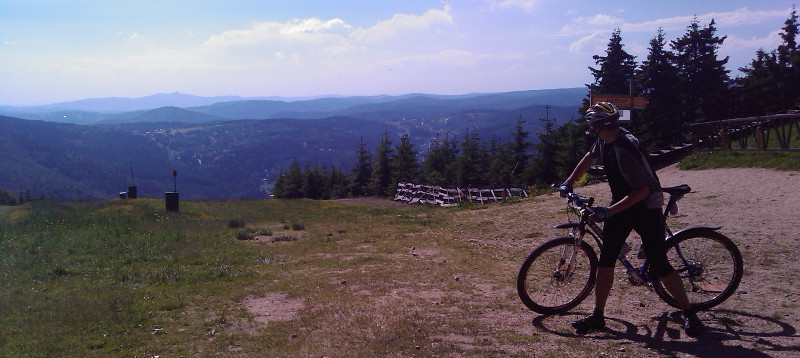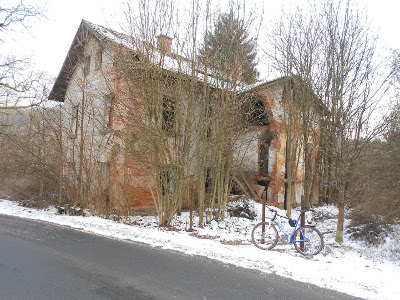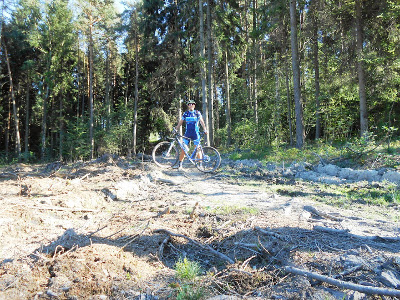How to train and regenerate
July 8, 2014

Thinking about training
Most cyclists I know or meet when discussing training only address mileage. However, instead of kilometers, it's better to count hours. Most ride high intensity and straight from home, but riding is mostly endurance and you need to get going first at the beginning of your training. It is necessary to not only complete proper cycling training but also rest well, only then will the athlete's performance grow and be able to perform at a high level on a regular basis. However, most cyclists do not address recovery, yet it is a necessary condition for performance progress!
How do I train when I'm not a professional?
For a hobby racer, training is fundamentally related to work. How is one supposed to perform well at work and then afterwards in sport? If one goes by the statistics, a professional has a more demanding training. But it's harder for him to train than for a working person. a competitive cyclist?
Cycling is typical and different from most sports in that it is very time consuming. A professional has more time and also, more importantly, more variability in training planning. (Although the professional again has to report his movements several months in advance to the anti-doping control.) Often he also has better security, whether it is financial or other support. In effect, the non-professional competitive cyclist comes out that way, who cycles for a living, but it's just a hobby, has it tougher. Therefore, for a hobby racer to make good training progress, the ability to to plan perfectly and accurately at least a week in advance and to have some idea of the next weeks. Since cycling is an outdoor sport, the cyclist must also be a bit of a meteorologist to be able to to predict the weather based on local conditions and meteorological data.
Of course, the training of a hobby racing cyclist is based on the general rules of training as seen, for example, in the pros, but more fundamental than that is adapting to the individual's capabilities. Again, this is strongly related to the time demands of the sport of cycling. Mostly, however, the question "How to train" is answered without taking into account, that a hobbyist, unlike a professional, has to earn his chain and his rice and only in the remaining time train. This is true of every sport, but it is the time commitment that makes it difficult in hobby cycling.
When creating a training plan, the first thing to remember is, how much time is taken up by work commitments, how they are spread throughout the week and how they can be handled. Leaving aside the professionals, where do you put entrepreneurs whether they are in business or not, working athletes can be divided into two groups:
- Workers work in shifts - the working hours are precisely defined. They work in shifts and even at night. Compared to other workers, the work tends to be more physically demanding and thus less restful as far as exercise is concerned. The advantage is that they have more time in the day and the 12th graders have more time off between work.
- Service employees - they have strictly set hours.
- Office workers - here I assume reasonable employers who allow flexible working hours do so.
Only when you have thought this through can you start planning your training, recovery, fun and other responsibilities. Crucial then is how to plan training with work. So I have some advice from my own experience. I take into account working on weekdays. Shift twelveers, I don't think, have a dilemma when making a schedule. Of course, the specific conditions and training of the individual must be taken into account. In the case of exclusive cycling to work, one needs to strictly adhere to weekend training days off. I would recommend a system:
- Monday - short training session focused on speed, strength or technique
- Tuesday - endurance, i.e. a longer workout in the aerobic zone
- Wednesday - compensation, it's a very free ride straight home from work
- Thursday - similar to Monday
- Friday - endurance, but longer than Tuesday
- Saturday and Sunday off.
The disadvantage of such a plan is its strict observance and in the case of very bad weather the whole plan is often thrown off. Wednesday is also problematic, when there are two compensations when there should be only one.
With good training and good judgement it is possible to train in the form of 5 days of training, increasing volume and decreasing intensity, and 2 days off. The early journey to work must be done exclusively compensatory!
Training if one is transported.
- Monday - free, drive to work.
- Tuesday - short workout focused on speed, strength or technique.
- Wednesday - endurance, so a longer workout in the aerobic zone.
- Thursday - off, drive to work.
- Friday - short workout focused on speed, strength or technique.
- Saturday - maybe something between Friday and Sunday or even endurance.
- Sunday - endurance. Usually longer (time) but can be shorter than Saturday.
If the morning route is not completely short, for example if the journey takes 45 minutes, it would be possible to insert one interval,
but you'd need to insert more frequent free time, and you certainly can't do it regularly, but only exceptionally.
That's why I recommend to take the morning commute only compensatory, here free.
And remember that training focused on quality is better than training focused on quantity!
Bike training before a race
Summer is the race season, and even though the weather is the best and the days are the longest, racers have to limit their training.
Whoever wants to commute to work by bike every day has to make some compromises anyway,
to be able to do more races, and if you want to race the whole season and still perform at the end of it.
The racing season starts in April and races continue until the beginning of October.
If I take the race seriously, I apply training before the race as follows:
Race on Sunday: take Friday off for training and then go out on Saturday.
I have a precise route where I can get a good run in and where the intervals are.
Specifically, it's a route that starts out flat where I'm going to start out, and then includes three hills where I'm going short intensity.
I will complete the entire route in an optimal 60 minutes.
If the race is on Saturday, I take Thursday off for training and Friday off for work,
to do one and only one training session to get me going.
I also have more time to prepare for the race.
I can start at noon, get my bike ready, cook food.
and just eat and relax in the evening.
If the race is on Wednesday after work, I have Tuesday off for training, and Wednesday I go to work compensating.
Of course, I go to the race on my own, where they just do a basic free heart rate warm up.
And I only do the Intervals after I sign up for the race.
Of course, it would be optimal to have two days of training time off before the race.
Also, you should not do any more hard training the week before the race!
The demanding training dose in this period is provided by the races.

Stress,Recovery and Stress
Training is a regular planned activity whose fulfilment is the stress on the body and the subsequent recovery, when the body is brought to a higher level of performance. It is actually a constant balancing on the edge, where the trainee tries to destroy as much as possible, but at the same time to get out of it. Thus, the same emphasis must be placed on regeneration as on cycling. As long as the athlete carefully monitors their condition and applies rest correctly, he can maximize his progress without overtraining. As a well-measured and objective variable, this is where early resting heart rate, which is good to monitor regularly.
Load
The load must be chosen appropriately. For the portion of the population that is healthy this should not be a problem.
But it is often the case that the novice individual overdoes the time and intensity of the workout out of great enthusiasm.
Most of the time it is not a major problem, because such a person simply prefers not to ride for a week.
It can be a more fundamental problem with racers, for them insufficiently hard training means no training progress
and overly demanding training means over-exertion and over-exhaustion.
This leads to overtraining or worse with regular training doses!
The opposite counterpart is the sick, who, on the contrary, avoid exercise.
They don't feel like doing anything and they also don't want to hurt themselves. However, movement is necessary and heals.
However, it is necessary to choose the right type of activity! Even the length and intensity must be adapted!
Thanks to exercise, athletes, but not top athletes, live to a long age while maintaining a high quality of life.
Stress
Not only physical but also mental stress is a burden that needs to be taken into account.
While the stress of training makes you want to graduate,
no one is interested in stress from a job or other life events, but you also need to recover from it!
Moreover, in today's hectic times, stress is becoming more and more of a problem for everyone
and it's causing big problems for people who don't train.
One of the major stress factors is cold, but that's why it's easily influenced.
It is not only harder to train and recover in the cold.
This is especially true in winter as a season
and so it needs to be taken into account and from autumn to spring to shorten the training sessions of untrained intensities,
be more careful overall and allow for longer recovery times.
Winter as a season also has a bad effect on the human psyche.
For training in cold weather it is necessary to dress appropriately and be warm after training.
More thought needs to be given to clothing also when racing in cold weather,
for a race, the competitor must not dress too warmly, but for the race you need to dress warmer!
If the racer doesn't address this, the racer freezes and doesn't get a good start and is cold at the start line.
Or conversely, if he doesn't take his clothes off at the start line, he will find that he is overheating.
When you go out for training when the weather changes or you are climbing mountains you need to prepare for training so,
so that the cyclist can adjust his clothing to the weather during training.
Because rain or going down a cold hill with a sweaty body is not pleasant.
Lack of sunshine, which again is mainly related to winter as a season. Therefore, it is best to take advantage of sunny days for any outdoor activity during this period.
Sleep deprivation ensuring you get enough sleep is a basic need, not just for athletes.

Regeneration
There are many ways to regenerate and how to promote regeneration. Better recovery means that you can train harder and more often and the body can handle it and then form goes up faster. Regeneration is divided into:
- Passive recovery - the body's self-regulatory recovery .
- Active regeneration - achieved by all invasive means
As for active recovery, cycling uses compensatory riding, which I can recommend after a hard long race. Massage and the forgotten and neglected stretching are widely used. The latest study even states that stretching is more beneficial than massage. My take on this is that stretching is cheap and accessible, no need to make an appointment and can be done anywhere, anytime and even in the familiar surroundings of the home. Any kind of regeneration should be practiced regularly. A random extra massage during the racing season can also be counterproductive. Personally, I don't go for massages during the season. It saves me the time and trouble of scheduling. I do, however, do regular stretching. I do full-body stretching twice a day during competition time. And moderately, when there is a spare moment, I also stretch throughout the day. It's also good to find a relaxing activity. Building models where concentration and fine motor skills are needed would not be the most inappropriate. For someone who works at a computer all day, it's good to get away from it and get out into nature, or just lie on a blanket in the sun and snooze. For those who run around all day, on the other hand, it might be nice to play a game on the computer in the evening.
For a good recovery, you need to have a good diet. Cyclists usually solve this only with food supplements while the basis is daily quality main meals. A good source of information in this regard are bodybuilders, because they are without proper nutrition in sport. Whereas in other sports, diet, is only addressed when the athlete's form isn't growing and they're looking for other options. As a result, the best athletes in whatever sport address diet. Also, pure weight training has become, a common part of all sports. Of course, it must be taken into account, that the bodybuilding diet and training is aimed at different goals than cycling and should be adapted accordingly.
The majority of the general Czech population uses alcohol for the purpose of mental recovery. For athletes it can be advantageous that beer contains a lot of energy in the form of carbohydrates. Of course you need to know your moderation well, but it is definitely not good to drink after training. Personally, I wonder what effect other means have on recovery. For example, the nowadays widely used marijuana not only among young people, but also among pensioners, also has an effect on the psyche, and pensioners use marijuana as a drug. So there are definitely some pros, but the question is what the cons would be for athletes in particular. However, marijuana is on the doping list and it is not even considered as a performance aid. As far as hard drugs go, it's known, that some of the best cyclists have used cocaine, for example, but some of them have gotten into it. However, it would be interesting to know if they included its use in their training plan :-D.
If you know how to train and what your goal is, it is not difficult to make a training plan. The key is to be able to react to the success and failure of previous training sessions and other situations and complications that come up during the season. And so it's good to have someone to talk to, or just to hire a coach, who can take care of those worries for you. Of course, keeping a training diary and training with a heart rate monitor is a must.
Video
In the following video, you'll hear basic advice and guidance from me on how to train with a focus on cycling. You can also send the link to the video to your friends so they know how to improve their performance.
I wish everyone to know what their goals are and work successfully towards them.
Articles on a similar topic
Newsletter
If you are interested in receiving occasional news by email.
You can register by filling in your email
news subscription.
+





